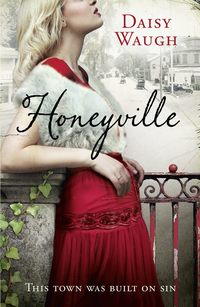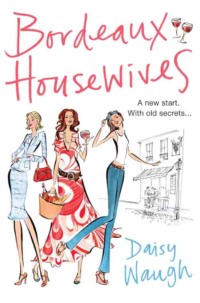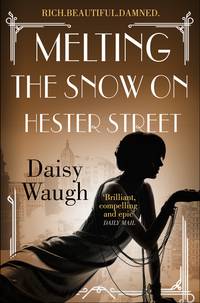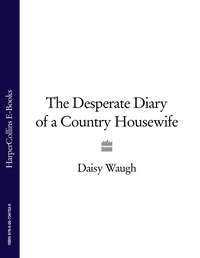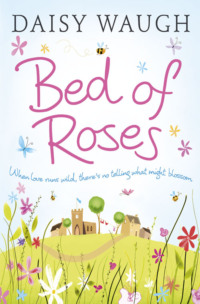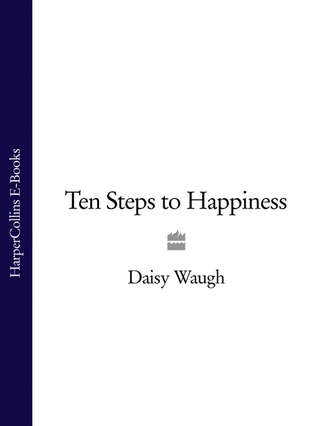
Полная версия
Ten Steps to Happiness

Ten Steps to Happiness
(in a Safe and Healthy World)
Daisy Waugh

Extracts from the Health and Safety First Principles Workbook and Food Safety Principles Workbook reproduced with the kind permission of the Chartered Institute of Environmental Health.
Extracts from Health and Safety Executive Catering Information Sheets and Workplace Health, Safety and Welfare, a short guide for managers reproduced with the kind permission of the Health and Safety Executive.
Extracts from the UK Department of Trade and Industry’s website on home safety, the insert to the Department of Education and Employment’s leaflet DL170. The Disability Discrimination Act 1995. What Employers Need to Know, and Health and Safety: Towards a Safer Workplace are Crown copyright material and reproduced with the permission of the Controller of HMSO and the Queen’s Printer for Scotland.
For Peter de Sales La Terrière with love
Table of Contents
Cover Page
Title Page
Excerpt
MISSION STATEMENT
Author’s note
(Step Minus One)
(i) UTILISE A SAFETY-FIRST ENVIRONMENT
(ii) SECURE TIME-BOUND PROGRAMME OF IMPLEMENTATION
(iii) PRIORITISE END-PRODUCT-RELATED GOALS
(iv) SUPPORT AND DEVELOP APPROPRIATE PROCEDURES
(v) OUTSOURCE NON-HIERARCHICAL INTERPERSONAL NEEDS
(vi) TARGET IDENTIFIABLE HAZARDS
(vii) TACKLE AND DEMOLISH NEGATIVE-OUTCOME VENTURES AND SITUATIONS
(viii) INITIATE ZERO-TOLERANCE STRATEGY TO CONFRONT ADVERSE BEHAVIOURS
(ix) ACTION A FULL AND FRANK ASSESSMENT OF CORE VALUES
(x) CO-OPT REALISABLE RESOURCES TO OPTIMISE TASK EFFECTIVENESS
Acknowledgements
Ten Steps to Happiness
By the same author
Copyright
About the Publisher
MISSION STATEMENT
(i) To acquire, facilitate and maintain:
an anxiety-and stress-free, healthful being-state in no less than 10 (ten) self-existent increments, the causal effect of which shall enable and release feelings of increased personal confidence, thereby leading to dynamic rebranding and repackaging of integrated learned responses to all living experiences.
YES!!
because HAPPINESS is achievable!
Author’s note:
TO MAXIMISE EFFECTIVENESS AND ENJOYMENT OF THIS SIMPLE, STEP-BY-STEP PROGRAMME PARTICIPANTS ARE FIRST INVITED TO…
(Step Minus One)
•…CONJECTURISE AN OPTIMAL CONTEXT
February 2001
Imagine a moment of perfect happiness with no past and no future and no thoughts of time ebbing away. With no thoughts of anything. No conscious thought at all. An instant of perfect happiness. Soft breeze. Soft sea. True love. True laughter. Giant turtles. And so on. These moments come once in a while to the very, very lucky. Of course they don’t usually last for long.
Jo Smiley and Charlie Maxwell McDonald, on the fourth day of their honeymoon, were lying in the moonlight on a small, empty, private beach in Mexico, only recently disturbed from their canoodling by the sound of a giant turtle dragging its hefty weight across the sand towards them. Its progress was slow and they watched it for ages before Charlie said – whispered, quite seriously, as if it were some new discovery:
‘It’s definitely coming towards us.’
Jo started giggling because they’d been watching intently all this time. There had never been any question where it was headed.
‘Why? What’s so funny?’ he murmured, turning to look at her, and then because he loved her, and he loved her laughter, starting to laugh himself.
The turtle stopped still. Silence.
‘Oh. Now we’ve frightened it,’ said Jo.
‘Or it thinks it’s frightened us. Either way we should set its mind at rest.’
Slowly they stood up and tiptoed back to their hut. It was a magnificent hut. Booking into this simple-looking corner of Paradise had been the most extravagant thing Charlie had ever done. He had imagined that his elegant, metropolitan wife, who until recently had been thriving in the luxurious world of Public Relations, would have been disappointed with anything less.
But he underestimated how much she loved him. Jo Smiley knew all about creature comforts, as fine-looking, highly effective, well-connected thirty-one-year-old London PR women are prone to. Jo had spent a lot of time and clients’ money in some of the smartest restaurants and hotels in the world. But that was all in the past now. And anyway it wasn’t the point. She would have been happy with Charlie anywhere. Anywhere. To have found a companion like Charlie; unworldly, unpretentious, tall, dark, funny, wise, kind and handsome (of course) was without doubt the greatest luxury of all.
In fact when Jo looked at Charlie and imagined the bucolic life which lay ahead of them she felt light-headed with hope for the future. The house they would be living in was beautiful; crumbling and uncomfortable and an insatiable swallower of cash, but it was lovely, and destined shortly to be lovelier still. When they returned to England she and Charlie were going to set to work restoring it. She and Charlie were going to build a dream-place together. Not only that, they were going to make it pay.
So when they weren’t watching tortoises or doing all the other things which enhanced their perfect happiness, they were talking about the future of Fiddleford Manor. It had been home to Charlie’s family for over two hundred years and now it was theirs and to keep the roof from caving in and everything else from falling apart, they were turning the house into a business. They were going to open the place up as a refuge for anyone in hiding from an angry public, or a baying and bullying press.
Jo envisaged a stream of tearful popstars, politicians and football managers knocking at the Manor door. She envisaged comforting them in a newly refurbished kitchen. With green tea, and Cristal champagne (if they wanted). And home-made flapjacks, perhaps. She envisaged Fiddleford Manor becoming a part of modern mythology, a perfect haven where no media was admitted and where suffering celebrities had to plead to be allowed in.
‘I was thinking, Charlie – don’t you think,’ she said some time later, as they wallowed in the beach hut’s circular sunken bath, ‘we could have a sort of meditation room. With very, very quiet spiritual music playing. And candles. A sort of multi-denominational-non-faith-specific chapel effect. Because people are going to be feeling very troubled when they first arrive to stay with us. They might appreciate a nice, quiet place to sit and think…’
‘It’s an idea,’ Charlie said tactfully. ‘If that’s what you want. But the bedrooms are pretty big, remember. If they want peace and quiet they could just stay in their rooms—’
‘And do you agree, Charlie,’ said Jo, who hadn’t been listening, whose mind had already moved on, ‘I was thinking maybe we could ban anyone who’s been in Big Brother. On principle. Do you think? Or do you think that’s a bit mean and snobbish?’
‘Big brother,’ repeated Charlie vaguely. ‘In big brother…’
‘The telly programme.’
‘The telly programme…’ It didn’t ring any bells. ‘Anyway, we’re supposed to be open to anyone, if they need us. And if we can fit them in. That’s the whole point.’
‘Quite right. We’ll just have to hope and pray they never realise they need us. I had another idea, though. Lovely idea. We could wire the house so it’s all on the same sound system. With speakers in every single room – can you imagine? So you’ve got music which is really beautiful – upbeat-but-ethereal – and it’s playing everywhere! In the kitchen, the bathrooms, the hall. Everywhere. All over the house. Wouldn’t that be amazing?’
‘So upbeat ethereal in the multi-faith-non-specific chapel?’ he said, smiling lazily. ‘But with the volume turned very, very low?’
‘Non-faith-specific,’ she corrected. ‘You think it’s a stupid idea.’ She didn’t mind. She had a thousand new ideas for the refuge every day, and so did he. Some of them were practical – they were going to have to build a couple more bathrooms. Most of them were pretty stupid. ‘I think we should employ a pilates instructor, don’t you? Live-in. Nobody will want to go to a retreat which doesn’t do yoga and pilates, however much trouble they’re in.’
‘Grey McShane didn’t seem to mind.’
‘Grey’s different. I love him, but he’s a lunatic. And an alcoholic. And he came to stay when it was still a house and he wasn’t paying.’
‘He’s paying now.’
‘No, but he wasn’t then. Anyway he’s a friend, he doesn’t count…By the way I don’t suppose he mentioned anything to you about moving out did he, before we left?’
‘Not exactly, no. I think he and Dad are both assuming they’re going to stay on and help run the refuge, since it was partly their idea. Dad says he’ll move into the cottage, but I’d be surprised…’
‘Well.’ Jo shrugged. Grey wasn’t a problem. She felt less enthusiastic about sharing a house with her intractable father-in-law, who didn’t like her and never would make any attempt to hide it. But he was old and lonely. He’d lived at Fiddleford all his life. And Charlie, who loved him, was all the family he had left. So he thought she was – whatever he did think. She didn’t care. She thought he was a fascist buffoon. They squabbled virtually every time they spoke, but it was harmless enough. Sometimes she wondered if they both didn’t even enjoy it. Either way she certainly wasn’t going to force him out. ‘It doesn’t matter, does it?’ she said. ‘It’s not like the house isn’t big enough.’
‘Grey wants to pay to put high voltage electric fencing all around the park.’
She smiled. ‘Can’t blame him after what they put him through.’ She sighed. ‘Poor sod. I think we should find him a girlfriend.’
‘And I think,’ Charlie laughed, slowly leaning across the bath towards her, ‘with his track record he’s more than capable of finding one for himself…’
And they lapsed into silence, and through the opened windows the breeze softened, the turtles frolicked, and any thoughts of the past and the future slowly ebbed away…
Accident – an unplanned, uncontrolled event with the potential to cause injury, damage or other loss.
Control or control measure – an item or action designed to remove a hazard or reduce the risk from it.
Reportable accident – one that must be reported to the appropriate enforcement authority.
Health and Safety First Principles Workbook, Chartered Institute of Environmental Health
(i) UTILISE A SAFETY-FIRST ENVIRONMENT
Spring 2001
Fiddleford Manor lay deep beneath snow. The boiler was broken, the house was freezing, the roof was leaking and there was a policeman at the bottom of the drive. Jo and Charlie had returned from their Mexican honeymoon only three weeks earlier, besotted, euphoric, absolutely one hundred per cent in love. And yet, as she looked out at the frozen landscape and the heavy, grey, endless sky, she thought for the first time of the perspex desk she had left in Soho, and of the low-fat, high-concept working lunch she would have been enjoying at exactly this moment six months ago, and briefly, treacherously, found herself wondering if she might have been better off staying in London, where mass cullings never interrupted the running of things, and where there was always emergency hot water at the gym.
A ludicrous thought, of course. And wrong, too. Jo loved her new life. She loved her new husband – of course. And she loved her old house.
It would have been difficult not to. Fiddleford Manor, built from the warm red local stone nearly three hundred years ago – vast, elegant and mostly held together by ivy – nestled magnificently inside its own landscaped park and, beyond that, a small and unspoilt and entirely unprofitable agricultural estate. There was a rose garden and a small lake with an old rowing boat to one side of the house, and a decrepit Victorian stable yard with its own broken clock tower on the other; at the front the long, wide lawns stretched past one towering cedar tree and the occasional jungle-like rhododendron all the way to the river bank. The house was a mile from the local village, where there was a church and a school and a small shop, four miles from the market town of Lamsbury and thirty-seven miles from the nearest train station, in the neighbouring county of Devon.
But right now Devon, like everywhere else, was out of bounds. The whole world was out of bounds. Ever since the man from Trading Standards had managed to struggle up the drive, with his appalling lilac-coloured office shirt, his appalling ‘Form A’, and his disinfected Wellingtons, it had been against the law for anyone to come on to or off the estate without a licence. And what with everything else that was going on, the entire countryside and every bureaucrat related to it in tailspin, no one had seen fit to grant a licence to the plumber. So the inhabitants of Fiddleford, Jo, Charlie, their difficult friend Grey McShane, and Charlie’s difficult father the General, huddled together in the kitchen, shivering and waiting.
They had been waiting for three days now. Or five days if you counted from the first telephone call, which was when everything really started changing. It came as they were finishing dinner. The General, who was meant – though he still showed no signs of it – to be in the process of moving into a large cottage at the end of the drive, had said, ‘Who the bloody Hell calls at this hour?’ and Charlie had gone off to find out. He came back into the dining room twenty minutes later, looking very bleak.
‘MAFF,’ he said simply.
Nobody spoke.
‘They’ve found a case of foot and mouth at Tom Shattock’s place. They’re sending a man round here in the morning.’
His father groaned.
‘But, listen, you never know.’ It sounded very hollow. ‘We might be fine…We might be absolutely fine.’
‘Poor old Shattock,’ murmured the General. ‘And it’s definite is it? Confirmed case?’
Charlie nodded. ‘Plus there’s another one suspected. It’s definite all right.’
The morning after that, while a Ministry vet inspected their cattle, Charlie led the lilac-coloured Standards man into the library. He’d wanted to know the exact whereabouts of every livestock animal on the estate: for ‘future reference’, he said; ‘in the event of evidence leading us to suspect…’ But they both knew what that meant. Charlie had been as helpful as he could. Or as he could bear to be.
He listed everything. Every single one of their 542 sheep, including the pregnant ewes, the three-day-old lambs, the seventeen rare and precious Dorset Horns. He told the man about his prize-winning dairy herd, and about his magnificent Jersey bull. He even mentioned his beloved twin sister Georgie’s billy goat which since her shocking death (in a riding accident a year and a half ago) had been bought a nanny companion and allowed to roam freely among the animals.
‘And that’s it?’ said the lilac man, clicking the top of his stainless steel pen and slipping it neatly into his lilac pocket. ‘Nothing else? No pigs?’
‘No.’
‘No new calves unaccounted for?’
‘No. None I haven’t mentioned.’
Lilac man offered a measly smile: ‘No nasty surprises lurking in forgotten corners anywhere? It’s a sizable estate.’
Charlie averted his eyes. He was a rotten liar, and he hated lying, but there were two animals he’d left out, whose existence at that particular moment was causing his body to break out in a cold sweat. Caroline and Jasonette, an ancient couple of Highland cows, had been wandering the park at Fiddleford ever since he and his twin sister were ten. They had been delivered, all those years ago, as a birthday surprise from their mother: twin calves, one for each of her twins. He and Georgina used to spend hours with them during the holidays, lounging around on their hairy backs, taking them on picnics (or taking picnics on them). They pinned photographs of their cows on their bedroom walls at school.
Once, when the twins were still small, and the cows were still calves and the sun was always shining and his twin and their mother were still alive, someone had left the front door open and both animals had been discovered looking bewildered, side by side in the middle of the hall. Their mother (the General had been away at the time, or it never would have happened) hadn’t yelled about the valuable paintings or the boring Japanese urn on the side table. She’d behaved as if everything was completely normal, as if the two little calves were making a perfectly ordinary social call.
She opened the door to the drawing room, since it was ‘nearly drinks time’, and invited the calves to come in. They followed her, the way calves do. The children had fetched bowls of milk from the kitchen, and the five of them had stood about beneath the portraits of disapproving soldiers, while Mrs Maxwell McDonald conducted a jolly conversation with all of them, exactly as if she had been entertaining the local vicar. Charlie and Georgie thought it was the most topsy-turvy thing they’d ever seen. They thought they would die from laughing. And the calves had looked so sweet and confused in the middle of that big drawing room, and their mother had looked so happy. It was one of the last memories they had of her before she fell ill. She must have died less than a year later…
Charlie looked out of the library window over the frozen hills to where the village lay, and the church, whose tower he could see, and the churchyard where his mother and sister lay side by side…He looked back at the lilac-coloured penpusher, with his measly lilac-coloured grin.
‘Nasty surprises?’ he said coolly. ‘At Fiddleford? Certainly not.’
The Ministry vet checked in with Jo and Charlie at the end of the same day. He’d not completed his inspection yet, he said, and he would be back first thing in the morning to finish off.
‘No signs yet, though,’ he said. ‘So fingers crossed.’
It gave them false hope. They all four drank too much that night. And then in the morning the vet returned and within minutes he’d found one of the heifers was limping.
She could have trodden on a sharp stone. More than likely, she had trodden on a sharp stone. Or one of the other cows might have kicked her. Or she’d woken up feeling stiff. It could have been any number of things. But the people from the Ministry weren’t willing to take the risk. Later that night came the official confirmation. There would be no need to take further tests. The limp was evidence enough. Death warrants had been signed and the slaughtermen were booked for Wednesday morning.
Since then, time for everyone at Fiddleford had been passing abnormally slowly. Jo wandered the house with her notebook, making obsessive and pointless notes about facilities which might be required for her future paying guests. Grey and the General, for lack of tabloid newspapers to argue over (their favourite – almost their only – pastime for several months now), were reduced to watching housewives’ television. Charlie, meanwhile, dealt with the animals, the farm workers, and the people from MAFF.
On Monday evening he telephoned the Ministry to inform them that the heifer’s limp had disappeared. On Tuesday evening he called again to inform them there were still no signs of infection among any of the other animals. But it was too late. That night the last of the animals were herded together into outhouses. The pyre was already built, and the sheep crushes and the cattle stocks lay waiting.
The snow turned to sleet that evening, and a cruel wind blew. Grey McShane, in a futile attempt to lighten everyone’s spirits, had lit a fire in the dining room. There was no food in the house, since the garden was covered in three feet of snow, and nobody was allowed out to go shopping. But Grey found an ancient tin of spaghetti at the back of the larder, which he plopped into a saucepan and burnt and then, with absurd fanfare, carried through to the dining room.
He doled out a plateful to Jo, who looked at it for several minutes and then suddenly leapt from her chair and ran out of the room. Charlie found her vomiting over the kitchen sink.
‘Are you all right?’ he said.
‘I’m fine. Completely fine. You go back in.’
‘Was it the spaghetti, do you think?’
She laughed.
‘Oh Christ, Jo, I’m so sorry. This must be awful for you.’
‘It’s fine. Please. Never mind me. I’m fine…I’m fine.’
‘We could get a licence and you could go and stay in London until it was over.’
‘Certainly not!’ She made an effort to smile, but the smile turned into a retch. ‘Oh, God—’ She retched again. ‘I think I’ll go upstairs.’
Jo ran to her bedroom and only just reached the basin in time. She stood there for a while, recovering, thinking, examining the splashes of vomit at her lovely, Mexican-tanned feet. She straightened up, wiped her mouth and, before she could change her mind yet again, headed over to the wardrobe and pulled out the testing kit which had been languishing there, driving her crazy, since the day before the MAFF people first called.
Afterwards she didn’t quite know what to do. Call her mother? No. Anyway she was away in El Salvador, taking artistic holiday snaps. Burst in on Charlie – and Grey and the General – in that freezing cold dining room? Definitely not. Have a bath?
There was no hot water for a bath. She decided to go straight to bed. She took off her uncomfortable urban clothes (skintight jeans @ £125, stripy cashmere jersey with pointless zip and hood), which were so incredibly ineffective in her new rural life, and replaced them with a pair of pyjamas and every jersey she could find in Charlie’s cupboard.
She lay awake for what felt like hours after that, trying to persuade herself it was real, trying to feel what she was meant to feel – fulfilled and magical and womanly and blessed, trying not to feel terrified of how her life, which until she met Charlie had always been so painstakingly well structured, seemed so quickly to be slipping out of her control. But then somehow she must have fallen asleep because she woke with a start at about three o’clock to discover that Charlie still hadn’t joined her.
Out on the icy landing she could find no sign of him either. The house was quiet. The vast, stone-floored entrance hall beneath her was shrouded in black. She bent over the banister and thought she saw a faint crack of light coming from beyond the back lobby, and then suddenly, from the same direction, she heard the muffled sound of something large crashing to the ground.
‘…Charlie?’
The house was old – especially the back part, the part where the noise was coming from. Among her many strengths (her warmth, her determination, her well maintained contacts book and, though she felt far from beautiful that night, her delicate elfin good looks), Jo was a practical woman, not remotely given to superstitious anxieties. But she was terrified.


